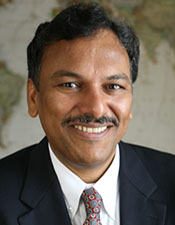Sep 21 2015
Northwestern University has received a five-year, $5 million grant from the National Science Foundation to establish, in collaboration with the University of Chicago, a new national resource that provides academic, small business and industry researchers access to cutting-edge nanotechnology facilities and expertise.
 Vinayak P. Dravid
Vinayak P. Dravid
In addition to traditional nanotechnology tools, the Soft and Hybrid Nanotechnology Experimental (SHyNE) Resource ensures the integration of soft (biological) nanostructures with the backbone of enabling hard materials, for applications such as microfluidic modules for bio-sensors and synthetic scaffolds for tissue regeneration, among others.
“SHyNE Resource streamlines our nanotechnology facilities, providing unique and integrated capabilities for internal Northwestern and UChicago researchers as well as external users, especially small and medium enterprises and startup companies,” said Northwestern’s Vinayak P. Dravid, SHyNE director. “This award further cements our leadership in nanotechnology and related advanced materials research, education and outreach.”
Dravid is the Abraham Harris Professor of Materials Science and Engineering at the McCormick School of Engineering. He also is founding director of the Northwestern University Atomic and Nanoscale Characterization Experimental Center (NUANCE), one of six Northwestern shared facilities in SHyNE.
The new resource deepens existing collaborations between Northwestern and UChicago and is expected to draw a variety of researchers from the Chicago area, the greater Midwest and nationally. SHyNE also offers regional colleges and public institutions, including museums, the opportunity to access research and training instrumentation under one umbrella.
SHyNE coordinates the extensive cryogenics, characterization and soft-nanopatterning capabilities found in Northwestern’s core facilities. Under the auspices of Northwestern’s International Institute for Nanotechnology, this diverse group of open-access nanoscale fabrication and characterization facilities includes the:
- Northwestern University Atomic and Nanoscale Characterization Experimental Center (NUANCE)
- Simpson Querrey Institute (SQI)
- Integrated Molecular Structure Education and Research Center (IMSERC)
- Northwestern University Center for Atom-Probe Tomography (NUCAPT)
- Cohen X-Ray Diffraction Facility (XRD)
- Northwestern University Micro/Nano Fabrication Facility (NUFAB)
SHyNE’s seventh facility, the Pritzker Nanofabrication Facility (PNF) at UChicago, is headed by Andrew Cleland, the John A. MacLean Sr. Professor for Molecular Engineering Innovation and Enterprise.
“This award from the National Science Foundation will provide critical support for external users who want to develop nanostructure fabrication and characterization at the University of Chicago’s Pritzker Nanofabrication Facility and at Northwestern,” Cleland said. “The Pritzker Nanofabrication Facility provides a unique research and development environment for the academic and industrial scientists interested in pursuing state-of-the-art micro- and nanoscale fabrication.”
SHyNE is one of 16 user facility sites nationwide that the National Science Foundation is funding with $81 million of support as part of a new National Nanotechnology Coordinated Infrastructure.
More information is available at the National Science Foundation.